In the competitive world of businesses, controlled maintenance of corporate expenses has emerged as one of the most significant elements in organizational performance. To streamline their financial analytics, modern businesses are more inclined to resort to digital tools, and Expense Management Software has become a must-have tool that businesses of all scopes can use.
The Expense Management Software transform the way that organizations monitor, process, and reimburse employee expenses by automating paperwork and real-time reporting of spending trends. Whether you have a small startup or a large enterprise, the right expense management solution is able to drastically streamline the administrative overhead, enhance compliance, and overall financial control throughout the organization.
What is Expense Management?
Expense management involves the controlled process of tracking, controlling, a nd reimbursing business expenses incurred expenditures made by employees through their working activities. It is a holistic process that incorporates the collection of receipts, classification of expenses, reporting, approvals, and reimbursement, through a systematized process flow.
Traditional Expense Management Software was mostly based on paper-based systems, spreadsheet-driven applications, and manual operations, which were time-consuming and prone to error. Modern Expense Management Software automates this entire process by digitizing each step, allowing it to capture an intelligent categorization of data, and allowing a streamlined approval workflow, saving time and resources in the organization and ensuring accurate financial reporting.
Why Expense Management Software is Important
Strong Expense Management Software have become a necessity in the modern business environment, where companies are looking to achieve financial transparency and operational efficiency in the hectic modern world.
- Automation: It can eliminate manual data input to minimize human error and improve productivity, with the cost of data processing being reduced to a large extent.
- Visibility: This gives real-time information on the spending trend that assists organizations in making intelligent financial decisions and budgetary planning.
- Compliance: This ensures compliance with the company policies as well as regulatory requirements due to a series of automatic validations and an approval workflow.
- Cost Control: Recognizes spending patterns and places of possible cost savings and avoids fraud or non-compliant expenses.
- Employee Satisfaction: Makes the reimbursement process easier and less time-consuming, and improves the overall experience of the employees when dealing with financial procedures.
Limitations to Look for in Expense Management Software
When choosing the Expense Management Software, companies need to consider possible disadvantages that are likely to impair business productivity and their position in the long run.
- Complexity: An Interface that is too complex, and thus needs much training to use and which will lead to lower adoption rates in the organization.
- Integration: Minimal connection between the new accounting system, payroll software, or any other business software in your current technology landscape.
- Scalability: or the lack of ability to scale to meet growing business needs, user volume, or changing organizational requirements over time.
- Customization: Limited ability to provide expense category flexibilities, approval processes, or reporting templates to fit business requirements.
- Support: Poor customer service, low training resources, and poor technical support that might impede effective implementation and utilisation.
Comparison Table for Expense Management Software
| Software Name | Rating | Best Feature |
| Expensify | 4.5/5 | SmartScan receipt technology |
| SAP Concur | 4.3/5 | Enterprise-grade integration |
| Fyle | 4.4/5 | AI-powered expense categorization |
| QuikChex | 4.2/5 | Complete HRMS integration |
| Zoho Expense | 4.1/5 | Seamless Zoho ecosystem integration |
| Happay | 4.3/5 | Corporate card management |
| ITILite | 4.2/5 | Travel expense predictions |
| Paybooks | 4.0/5 | Indian market compliance |
| QuickBooks | 4.4/5 | Comprehensive accounting features |
| Rydoo | 4.1/5 | Smart receipt scanning |
Top 10 Expense Management Software
1. Expensify
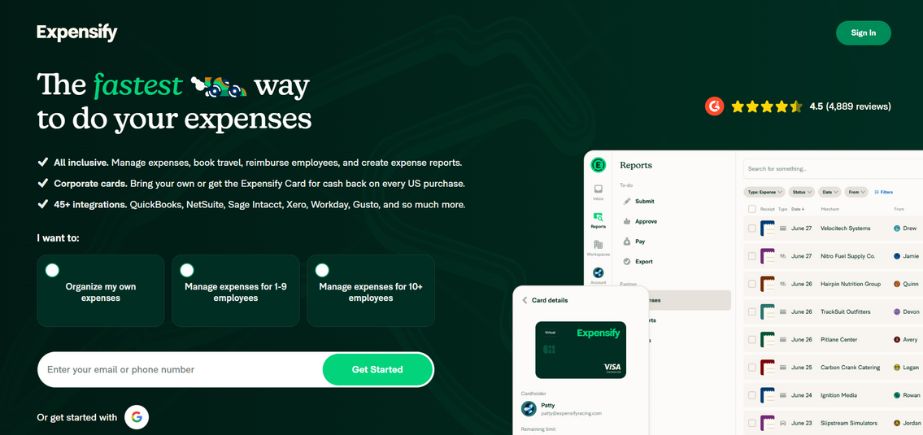
Rating: 4.5/5
Website: https://www.expensify.com/
Best Use Cases: Large enterprises requiring comprehensive spend management solutions
Expensify is a universal Expense Management Software that allows for unifying expense reporting and robust spend management functionalities. The system has advanced capabilities such as SmartScan technology to process receipts automatically, integration of company credit cards, and advanced reporting capabilities. Its advantage is in the ability to integrate different types of payments and banks, and in the detailed expense tracking of different departments.
The products are attractive to individuals and big companies, and they can be scaled up and down according to business requirements. Nonetheless, the user is advised to expect a learning curve since the platform is feature-rich, and it would take time to put all the features to use.
Key Features:
- SmartScan receipt processing
- Multi-department expense splitting
- Corporate card integration
- Advanced reporting dashboard
- Mobile expense submission
Pros:
- Excellent payment integration
- Powerful reporting tools
- Scalable for enterprises
Cons:
- Steep learning curve
- Higher pricing structure
- Complex initial setup
Pricing: $5 per member/month
2. SAP Concur
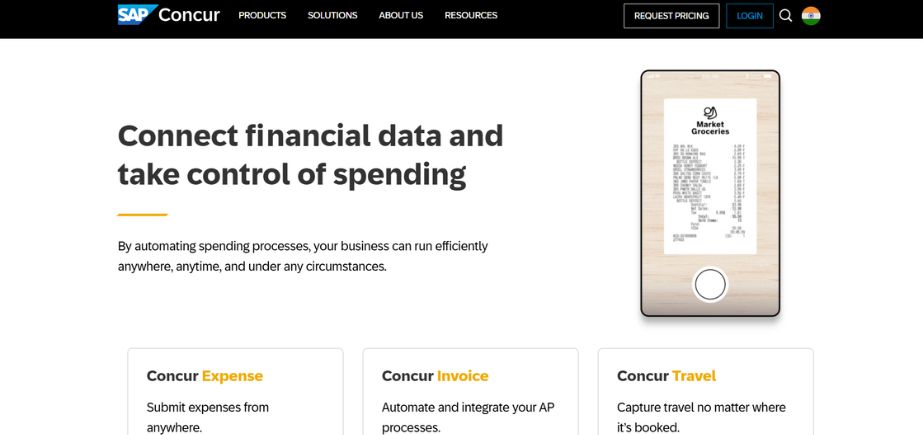
Rating: 4.3/5
Website: https://www.concur.co.in/
Best Use Cases: Large corporations needing robust travel and expense integration
SAP Concur is the Expense Management Software that allows the company to achieve the most complex expense and travel management activities. Driven by this formidable platform, all corporate spendings are brought under one umbrella and offers unmatched access to the financial transactions throughout the organization.
The software performs well in the complex approval workflow, multi-currency transactions, and integration with the rest of the existing enterprise resource planning systems. Concur relies on the robust system framework of SAP that provides the best security and reliability functions that are essential in large organizations. Although the platform offers a full range of functionality, it can be a price and complexity barrier to smaller operations that have more basic expense management requirements.
Key Features:
- Enterprise travel integration
- Multi-currency support
- Advanced workflow automation
- Comprehensive audit trails
- Real-time expense visibility
Pros:
- Highly configurable platform
- Strong brand credibility
- Excellent enterprise features
Cons:
- Expensive implementation costs
- Complex setup process
- Overwhelming for SMEs
Pricing: $9 per user per month
3. Fyle
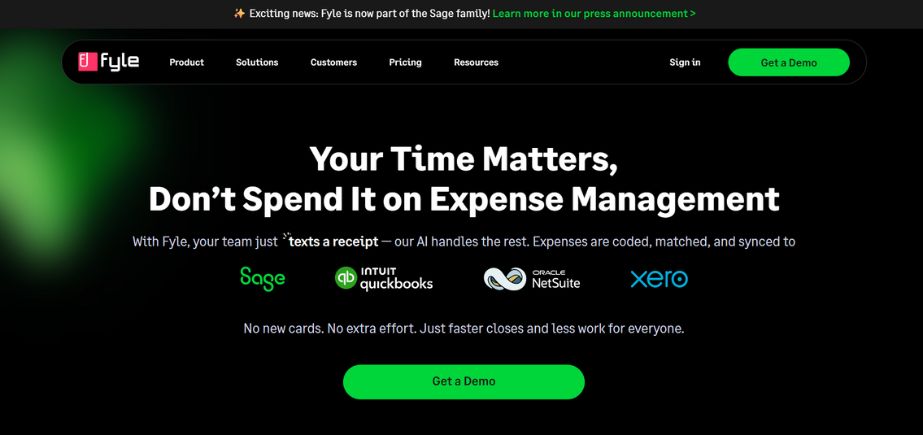
Rating: 4.4/5
Website: https://www.fylehq.com/
Best Use Cases: Mid-sized companies seeking AI-powered automated expense processing
Fyle makes using AI and working through machine learning to turn corporate Expense Management Software into a fully automated process. The flexibility and easy interface facilities smooth the process of receipt capture and classification of expenses and reports, maintaining high accuracy levels using AI-based validation.
The connectivity enables the flexible characteristics of this software to interface with the popular accounting packages and other ERP systems as a means of offering a lucid financial system to organizations. The exceptional feature of the software is that it reduces human input due to intelligent automation, and thus the expenditure is highly conducive to be processed faster as opposed to prioritising accuracy. Although Fyle has very large functionalities, it can be limiting on the extent that the organizations that have high customization can manipulate the system to fit in specific needs of their business.
Key Features:
- AI-powered categorization
- Intelligent receipt scanning
- Multi-platform integration
- Automated report generation
- Real-time expense tracking
Pros:
- Clean user interface
- Excellent integration options
- Advanced AI features
Cons:
- Limited customization options
- Higher advanced feature costs
- Restricted workflow flexibility
Pricing: $11.99 per active user / month, billed annually.
4. QuikChex
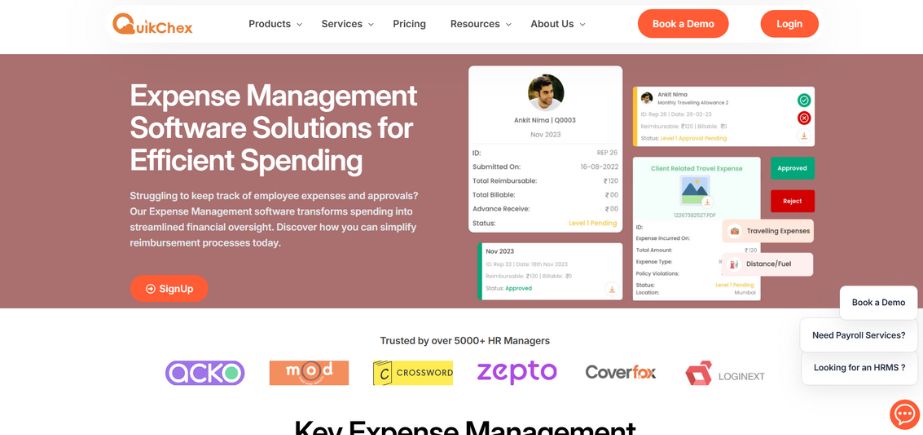
Rating: 4.2/5
Website: https://quikchex.in/product/expense-management-software/
Best Use Cases: Small- to medium-sized businesses requiring integrated HR and expense management
The QuikChex distinguishes itself by providing a one-stop Human Resource Management System coupled with potent Expense Management Software facilities. The combination of the two features means that companies do not have to install several software to deal with employee expenses and essentially need one platform to oversee HR activities.
The software has a user-friendly interface to make expense submission and approval easy, whilst it is highly customizable to be utilized by HR managers. Its mobile and web software are also available to support accessibility on various devices and locations, so that employees can enter expenses at their convenience, even when on the move. Having a low price and a wide range of features, it is especially appealing to small-sized companies, but bigger organizations may need more specific features.
Key Features:
- Integrated HRMS solution
- Custom expense categories
- Mobile expense submission
- Configurable approval workflows
- Cost-effective pricing
Pros:
- Complete HR integration
- Highly customizable interface
- Affordable pricing structure
Cons:
- Limited enterprise scalability
- Restricted global presence
- Basic reporting features
Pricing: ₹4,500/month
5. Zoho Expense
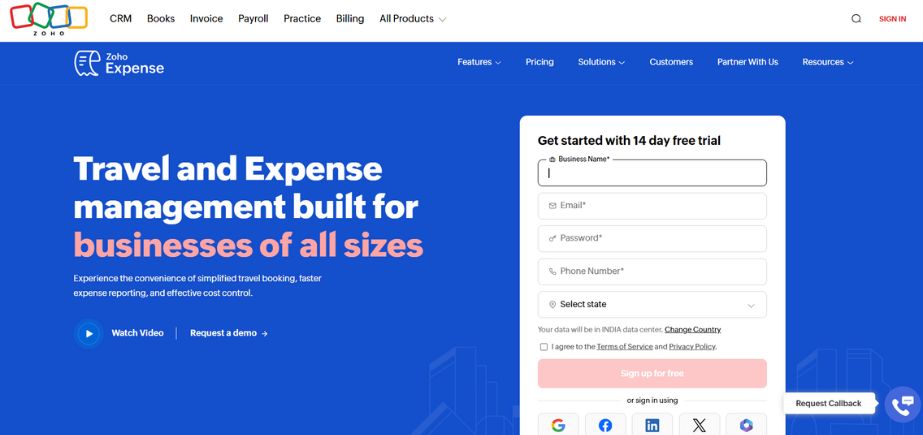
Rating: 4.1/5
Website: https://www.zoho.com/in/expense/
Best Use Cases: Organizations already using Zoho ecosystem products
Zoho Expense relies on the terms of the built Zoho brand to provide guarantees of the Expense Management Software of a high rate of reliability that can be combined with the other Zoho products. The platform offers web and mobile-based applications that provide flexibility in the manner in that employees can submit and the manner in that managers can approve expenses.
It is strong in its native integration with Zoho Books, Zoho People, and other tools in the Zoho ecosystem to form a complete business management ecosystem. The software manages the entire process of a receipt to reimbursement effectively and also offers significant information about the company’s expenditure trends. Nevertheless, the process of expense submission and reporting can be relatively complicated according to the organizations, and the platform may not be configurable to accommodate the more complex and hence larger organizations.
Key Features:
- Zoho ecosystem integration
- Web and mobile access
- Automated expense workflows
- Financial reporting tools
- Receipt management system
Pros:
- Strong brand reliability
- Excellent product integration
- Comprehensive workflow automation
Cons:
- Complex reporting process
- Limited mid-size configurability
- Steep learning curve
Pricing: ₹79 per user/month
6. Happay
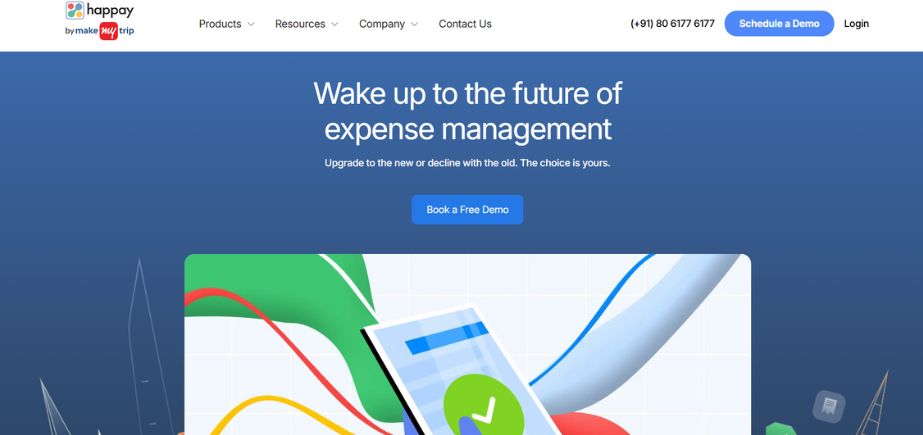
Rating: 4.3/5
Website: https://happay.com/expense-management-software/
Best Use Cases: Companies requiring corporate card management with expense tracking
Happay offers a front-to-back spend management solution, integrating corporate card products and feature-rich expensing functionality. The system based on the cloud offers real-time visibility of corporate expenditure and improves efficiency throughout the period expenses management process, including the authorization and reimbursement. Its power is that it provides physical and virtual corporate cards and expense management functionality to deliver an end-to-end spend management system.
The platform synergizes well with various accounting and enterprise resource planning systems, thus has a seamless input of business information on diverse business systems. Although Happay is a powerful tool to manage corporate spending, smaller companies that have a few and less complicated particular expense requirements may find the overall functionality of the platform more comprehensive than they need.
Key Features:
- Corporate card integration
- Real-time expense reporting
- Cloud-based platform
- ERP system connectivity
- Comprehensive spend analytics
Pros:
- Complete spend management
- Real-time reporting capabilities
- Multiple system integration
Cons:
- Complex for small businesses
- Higher-tier feature costs
- Advanced setup requirements
Pricing: Customized pricing
7. ITILite
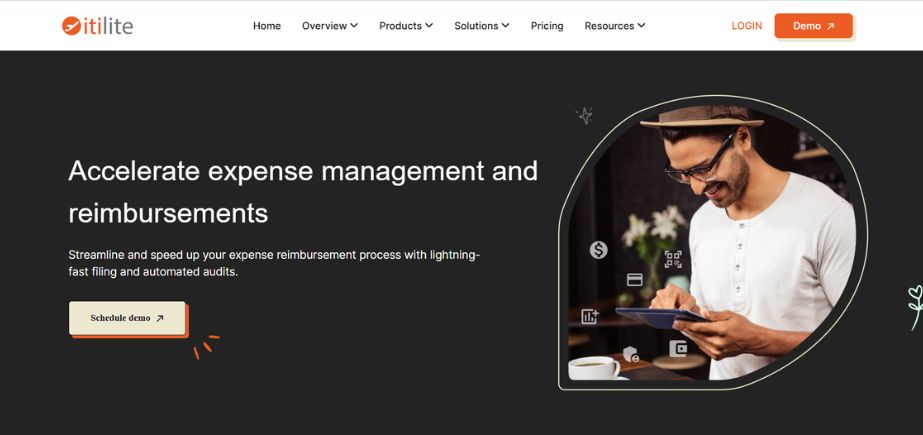
Rating: 4.2/5
Website: https://www.itilite.com/
Best Use Cases: Organizations with frequent business travel requiring expense predictions
ITILite focuses specifically on AI-driven travel and expense management with such distinctive predictive features that provide forecasted travel costs and reward cost-conscious behavior. The innovative strategy used by this platform involves suggesting and rewarding employees to avoid making foolish and wasteful buying choices when they are travelling on business. Its predictive algorithms use past data and market trends to accurately predict the cost of travelling and en as such, they assist organisations in budgeting better.
The integrated travel booking system and expense management solution, with the application of the software, allows frequent business travelers to have a seamless experience. Organizations with greater demands in line with expense management, that are not necessarily limited to traveling expenses, may instead find a necessity to make additional integrations, with ITILite being more travel-based, than general business expense.
Key Features:
- AI-powered cost prediction
- Travel booking integration
- Smart spending recommendations
- Reward system implementation
- Predictive budget analysis
Pros:
- Unique travel focus
- Predictive cost analysis
- Innovative reward system
Cons:
- Limited non-travel expenses
- Requires HRMS integration
- Narrow specialization focus
Pricing: Custom pricing
8. Paybooks
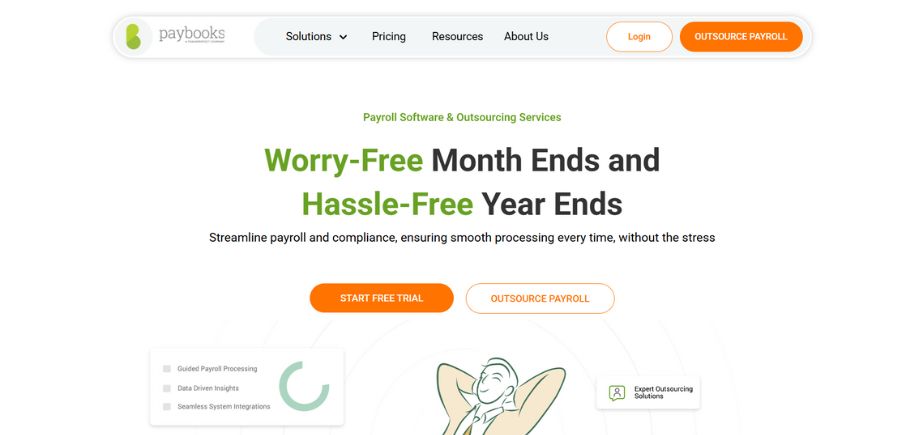
Rating: 4.0/5
Website: https://paybooks.in/
Best Use Cases: Indian small- to medium-sized businesses needing HR-payroll-expense integration
Paybooks Europe enables the Indian market with an integrated HR, payroll, and Expense Management Software ideally suited to small to medium-sized businesses. The platform is in tune with the peculiarities of the compliance of the Indian companies and implements the features required to ensure that regulatory requirements are met. Its mobile interface means the system is easily accessible to employees, and the mobile functionality means that it can integrate with a company as it grows, without losing the extensive workforce management features that are necessary.
The advantage of the software is that it offers a full set of tools that handle the financial and administrative aspects of employees in one platform, mitigating the issue of having many systems to manage. However, it can be restrictive in terms of functionality in an organization that operates on a global scale since the functionality was limited by the constraints of the Indian business ecosystem.
Key Features:
- Integrated HR-payroll system
- Mobile expense interface
- Indian compliance features
- Workforce management tools
- Administrative automation
Pros:
- Complete HR integration
- Mobile-friendly design
- Strong compliance focus
Cons:
- Limited global functionality
- Basic advanced features
- Regional market focus
Pricing: ₹2499 per month
9. QuickBooks
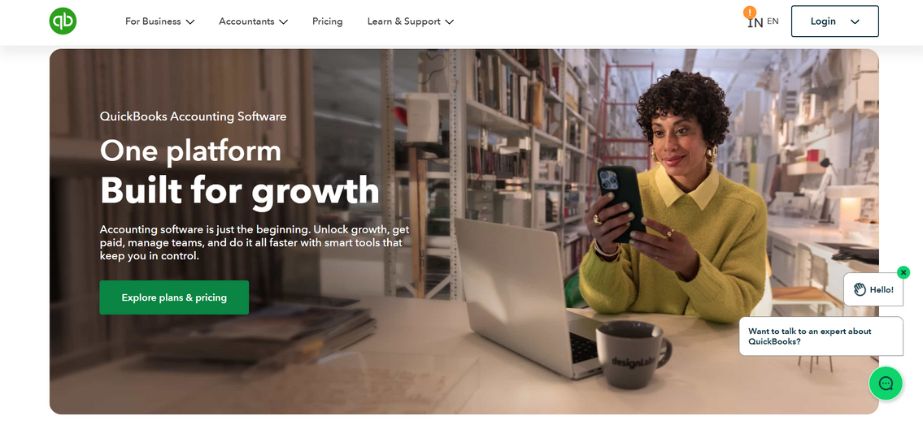
Rating: 4.4/5
Website: https://quickbooks.intuit.com/global/
Best Use Cases: Businesses needing comprehensive accounting with expense management features
Intuit created QuickBooks, which is a complete accounting software that has a strong business expense management feature within the overall financial management system. The software has strong financial tracking capabilities extending beyond simple expense reporting to powerful accounting, such as invoicing, payroll, and even more detailed financial analysis. Its inbuilt ability to interface with banking institutions and financial services makes it build a harmonized financial ecosystem which can serve businesses of all sizes.
The advantage of this platform is that it offers fully featured accounting capabilities that extend well beyond expense management, a nd hence it is well suited to an organization in need of full financial control. Nonetheless, companies interested in investing in a specialized Expense Management Software may find it cumbersome to use QuickBooks, and it may be a costly option to organizations that only need the basic in-built expense tracking features.
Key Features:
- Comprehensive accounting integration
- Banking system connectivity
- Financial reporting tools
- Invoice management system
- Payroll processing capabilities
Pros:
- Robust accounting features
- Excellent banking integration
- Suitable for various sizes
Cons:
- Not a standalone solution
- Complex for simple needs
- Higher pricing structure
Pricing: US$1.90/mo
10. Rydoo
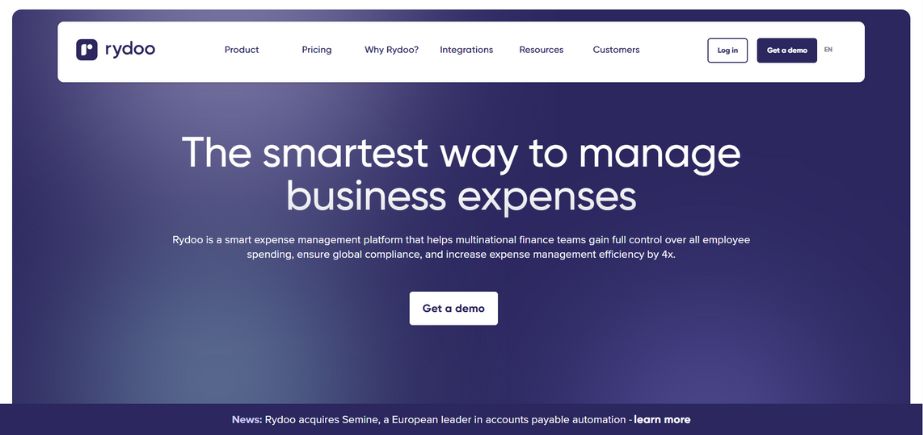
Rating: 4.1/5
Website: https://www.rydoo.com/
Best Use Cases: Companies requiring smart receipt processing with travel integration
Rydoo provides an advanced expense management application and integrates smart receipt processing with the full functionality of travel management. Smart scanning feature offered by the platform does not require manual data input because it recognizes the relevant information on receipts with a high accuracy level. A mobile-first strategy ensures that workers can conveniently add expenses on the go, and real-time expense reporting allows users to stay on top of their budgets.
The software works perfectly with most accounting systems and develops a convenient interface between the expense reporting system and financial management systems. Although Rydoo is a very competitive expense and travel tool, organizations with a broader set of features that the tool wants to manage expenses may be necessary to expand to include tools, as entry to expense-focused management tools is limited outside of the area of travel expenses, and the pricing of the tool may be difficult to support small companies with limited budgets.
Key Features:
- Smart receipt scanning
- Travel management integration
- Real-time expense tracking
- Accounting software connectivity
- Mobile-first design
Pros:
- Superior scanning technology
- Excellent travel integration
- Real-time tracking capabilities
Cons:
- Limited comprehensive features
- Higher pricing structure
- Narrow solution focus
Pricing: € 8 Per user/per month
How to Choose the Right Expense Management Software
Choosing the right expense management solution must take into consideration a range of factors, which are in line with the needs and long-term goals of your organization.
- Budget: Know your financial limitations and assess the total cost of ownership on implementation, training cost, and subsequent subscription cost. Comparing the solutions, take into account the pen-and-paper costs and the value offering in the long run.
- Scalability: Examine the scalability of the software in regard to the growth you forecast your company in terms of number of users, transactions, as well as business requirements in the next few years.
- Integration: The integration of the management expense platform with existing accounting modules, payroll systems, banks and other crucial business systems within your current technology environment has to be considered.
- Functions: These are core functions fulfilling the requirement of the users which may include scanning and tracking of the receipts, access across the platforms, approval workflows, reporting tools and compliance facilities that are suited to the unique needs of your business processes.
- Support: Evaluate the quality of customer support, training materials, deployment, and ongoing technical support that the vendor will provide to take full advantage and sustain operations.
Conclusion
The selection of the proper Expense Management Software is one of the most important decisions, which may profoundly affect the level of the financial performance within your organization and the fulfillment of your employees.
The solutions that are considered in this ultimate guide provide various options in expense management, including AI-powered automation platforms and integrated HR systems to enterprise-level solutions. Whether one has a small startup that requires cheap solutions or a corporation with a highly sophisticated feature requirement, the catch is to identify a software that has the features which your business requires.
Make comparisons such as cost constraints, scalability requirements, and integration requirements, and desired features when selecting. With a good investment in quality expense management technology, you will receive your repayment in the form of a high quality of accuracy, reduced processing time, a better level of compliance and financial visibility across your organization.
Frequently Asked Questions
Q1: What is the most cost effective software to utilize within a small organization to control expenses?
QuikChex and Paybooks are less expensive, at 99-149/user per month with a complete expense management solution or it comes with a bonus of being integrated with HR functionality, ideal to the field of small businesses.
Q2: What is the best mobile experience for Expense Management Software?
Both Expensify and Fyle offer a great mobile experience, utilizing advanced receipt capture, real-time submission of expenses, along with user-friendly interface features to manage expenses on the fly.
Q3: Do expense management software products link to legacy accounting systems?
Yes, most contemporary applications, such as QuickBooks, Zoho Expensee, and Fyle, have made simplifying integration with such common accounting software applications, such as Tally, SAP, and various ERP systems, a reality.
Q4: What points should be prioritized when it comes to selecting Expense Management Software?
Note the features of receipt scanning, mobile support, exporting approaches, reporting, adaptability and conformity that suit your specific business requirements and practices.
Q5: Is Expense Management Software on cloud secure to financial data?
The well-known providers of enterprise-level security are SAP Concur, Happay, and other established platforms thus providing data encryption, access to secure servers and certifications on adherence to financial compliance.
